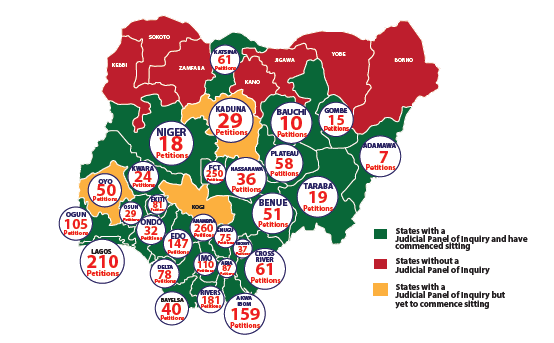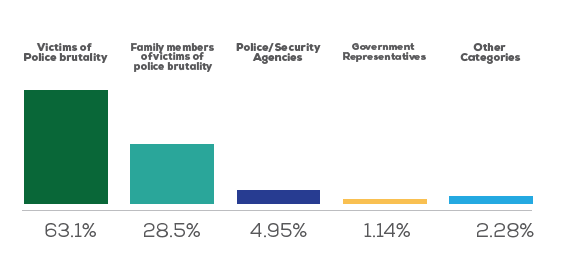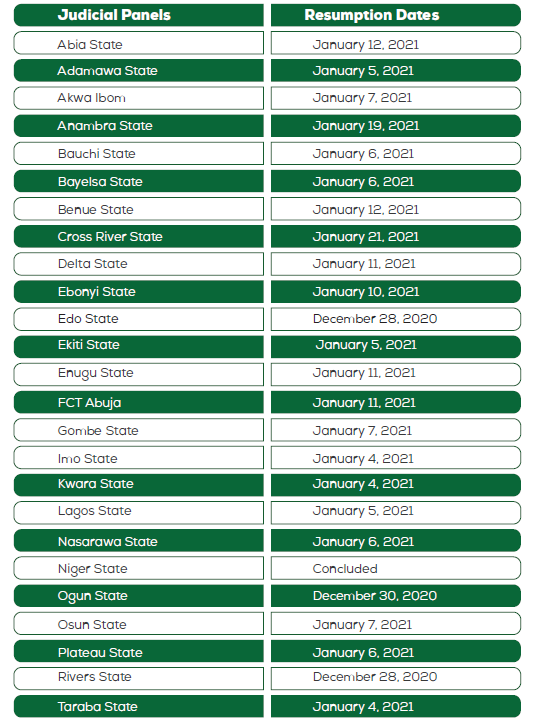14th December – 25th December 2020
In the last two (2) months, the Judicial Panels of Inquiry set up in 26 States have received petitions from victims of police brutality, their representatives, and others as part of the response to the demands of the #EndSARS protests across major cities in Nigeria in October 2020. Reports from independent citizen observers deployed by Yiaga Africa across the states and the FCT indicate that states like Oyo, Kaduna and Kogi which constituted its Judicial Panels of Inquiry are yet to commence sitting but petitions are being received at the Panel Secretariat in Oyo and Kaduna States. Furthermore, Bayelsa state has commenced its panel sitting. Borno, Jigawa, Kano, Kebbi, Sokoto, Yobe and Zamfara States are yet to set up their Panels.
Yiaga Africa and Enough is Enough (EiE) Nigeria commend the work of the Panels across the states as the number of petitions submitted is an indication of the desire of citizens to get justice for human rights violations. In addition, the petitions before the Panels and presentation of cases reinforces the need for a comprehensive reform of the Nigeria Police Force and other security agencies.
In the week under review, Yiaga Africa’s independent citizen observers continued to attend the Panel hearings. In addition, with the holiday season, reports indicate that some of the Panels will proceed on recess for the Christmas holidays to resume in the last week of December or January 2021.
When the Panels resume, Yiaga Africa, Enough is Enough (EiE) Nigeria and other civic actors will continue to monitor proceedings, following through the process to provide information to citizens and promote accountability. In addition to the support by the Nigeria Bar Association (NBA), Citizens’ Gavel is also providing legal support to help citizens document their evidence for the Panels.
Findings from the period under review include:

- Increase in the Number of Petitions Submitted across States: The period under review shows an increase in the number of petitions submitted. Data from the Panels show the following number of petitions submitted across the states: FCT – 250 petitions, Rivers State – 181 petitions, Anambra State – 260 petitions, Edo State – 147 petitions, Lagos State – 210 petitions, Imo State – 110 petitions, Abia State – 87 petitions, Akwa Ibom State – 159 petitions, Ekiti State – 81 petitions, Katsina State – 61 petitions, Plateau State – 58 petitions, Cross River State – 61 petitions, Ogun State – 105 petitions, Oyo State – 50 petitions, Enugu State – 75 petitions, Benue State – 51 petitions, Ondo State – 32 petitions, Osun State – 29 petitions, Bayelsa State – 40 petitions, Niger State – 18 petitions, Kwara State – 24 petitions, Nasarawa State – 36 petitions, Delta State – 78 petitions, Ebonyi State – 37 petitions, Taraba State – 19 petitions, Adamawa State – 7 petitions, Gombe State – 15 petitions, Bauchi State – 10 petitions, Kaduna State – 29 petitions.
- Victims Constitute 63.1% of Witnesses Approaching Panels of Inquiry for Justice across the States: Reports from the Yiaga Africa observers show that so far, 63.1% of witnesses that have made submissions are victims of police brutality; 28.5% are family members of victims of police brutality; 4.95% are police/security agencies; 1.14% are government representatives; while 2.28% fall into other categories.

- More Evidence Presented across Panels of Inquiry: In the Adamawa State Judicial Panel of Inquiry, a petitioner, who is the father of a victim of police brutality presented the medical records of his child as evidence proving his son was brutalised by the police. The petitioner also presented his own medical records of high blood pressure resulting in heart and kidney disease which were caused by the trauma when his child battled for his life after being brutalized by the police. The father also tendered as evidence, a letter of deferment he obtained from his educational program just to enable him to provide adequate care to his hospitalized child. Other evidence presented across the different state Panels include:
- Pictures, medical certificates, death certificates, and hospital bills of two (2) victims killed by the police in Plateau State;
- Pictures of a victim whose death was as a result of police abuse, 17 pictures of victims of police brutality, abandoned police uniforms picked up from a scene where police abused some victims, cars that were burnt by police officers and pictures of vandalized houses by a police officer were presented by petitioners in Rivers State;
- Pictures of a deceased victim of police brutality and copies of medical reports and receipts of surgery conducted on a victim who was shot by police were presented by petitioners in Akwa-Ibom State;
- Damaged phones and a newspaper containing a publication of police brutality were presented by a petitioner as evidence in Ogun State;
- Pictures of a victim of police brutality were presented by a petitioner in Benue State;
- Two (2) newspaper publications, a plaintiff amended statement of claim, a Certified True Copy (CTC) of notice of preliminary objection, a ruling of the High Court and a CTC of Judgement detailing a conviction of a police officer, prison sentence and compensation awarded against a police officer were presented as evidence by petitioners in Taraba State;
- A victim who was shot in his leg by police presented his wounded leg as evidence in Imo State. Another petitioner presented a newspaper publication and pictures of Late Mr.Oguzie Jude Mmezi in Imo State;
- A CD plate containing video evidence of police brutality, pictures of a deceased and autopsy reports of a deceased victim of police brutality were presented in Edo State;
- Medical payment receipts and vehicle purchase receipt were presented by petitioners in Ekiti State;
- A confessional CD plate containing video evidence was presented by the police against a petitioner in Delta State;
- A petitioner presented his hospital card as evidence in Gombe State;
- A picture of a victim’s house vandalized by police was presented in Abia State;
- Medical payment receipts to the tune of Four Million, One Hundred Thousand, Two Hundred and Twenty-Two Naira (4,100,222 naira) were presented by a petitioner in Ebonyi State.
- Judicial Panels go on Recess for the Holidays: Some states have concluded the process of receiving and hearing petitions. All are taking a break for Christmas with some returning in the last week of December, 2020 and others early in the new year.

Yiaga Africa and Enough is Enough (EiE) Nigeria note and recommend the following:
- Provide Updates on the Work Conducted by the Panel since Establishment: In order to ensure citizens are informed of the work done by the Panels since their establishment, as the Panels resume, they should provide a status report and the next steps to promote transparency and build confidence in the process.
- Provide Public-Facing Channels: The Panels in Kwara, Ogun and Lagos States and the National Human Rights Commission Panel in FCT have deployed technology to promote participation and transparency via public-facing channels that keep citizens updated. As Panels resume, Yiaga Africa and EiE call on the Panels to integrate public-facing channels for their sittings.
- Legal Support for Victims of Police Brutality Across the Judicial Panels of Inquiry: Yiaga Africa and EiE note that victims of police brutality across the panel require legal support in order to effectively seek justice. We commend the Nigeria Bar Association (NBA) in Kwara, Anambra, Ebonyi, Enugu, Ogun and Plateau States for committing to providing free legal representation to victims of police brutality and recommend that such support should be provided in other states. Similarly, we recommend support to provide legal and/or psycho-social support to victims and their families. This will be very helpful to them as they seek justice for the abuse experienced in the hands of officers of the law.
- The Neutrality of Panel Members: We note that in Anambra State, there have been allegations that some of the panel members are political appointees to the Governor, William Obiano and were handpicked by him to serve on the panel. These members are loyalists of the Governor and may tilt their judgement in favour of the Governor’s interest. In the same vein, a member of the Lagos Judiciary Panel tweeted disparaging remarks about CNN, stating that they were “complicit’ in the protests. We call on all members of the Panel to refrain from biased statements and remain neutral as arbiters working for justice. As a standard, members of the Judicial Panels of Inquiry are to remain impartial arbiters.
Signed
Cynthia Mbamalu
Yiaga Africa
‘Yemi Adamolekun
Enough is Enough (EiE)
Click here to download
